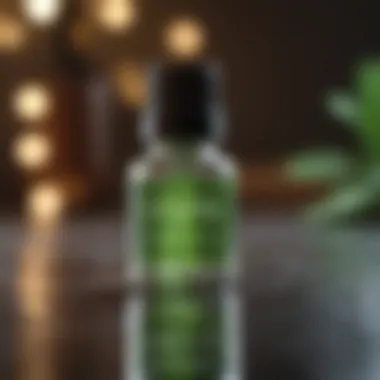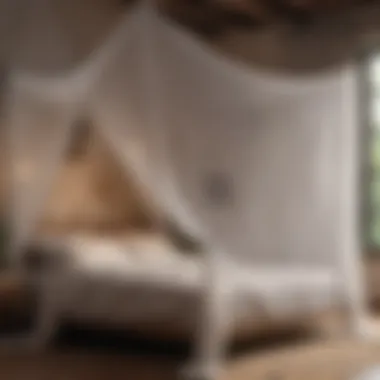Discover Effective Strategies to Combat Mosquitoes in Your Living Space


Animal Species Profile
Mosquitoes, those tiny yet relentless creatures, have a remarkable ability to disrupt our peace and tranquility. Understanding their behavior and characteristics is key to effectively eliminating them from our living spaces. Mosquitoes belong to the family Culicidae and are known for their small, slender bodies and distinctive long mouthparts used for feeding on blood. Their natural habitat spans across various environments globally, from humid jungles to urban areas, where they thrive near standing water like ponds and marshes. While appearing fragile, mosquitoes exhibit surprisingly resilient behaviors, especially in their search for a blood meal.
Preventive Measures
The first line of defense against mosquitoes involves implementing preventive measures to minimize their presence in your room. Keeping doors and windows tightly sealed, installing fine mesh screens, and using mosquito nets around beds are effective ways to create a barrier against these pesky insects. Additionally, removing standing water sources, such as flower vases and clogged gutters, significantly reduces mosquito breeding grounds. Repellents containing DEET or picaridin provide a protective shield when outdoors, while citronella candles and mosquito coils can help repel mosquitoes indoors.
Natural Repellents and Traps
For those inclined towards natural alternatives, a range of botanical repellents and traps offer a chemical-free approach to mosquito control. Essential oils like citronella, lavender, and eucalyptus possess natural repellent properties and can be used in diffusers or homemade sprays to ward off mosquitoes. Furthermore, intricate traps utilizing light and carbon dioxide attractants can help capture and eliminate mosquitoes without the use of harmful chemicals. Implementing a combination of these natural solutions can create a hostile environment for mosquitoes while maintaining a safe and eco-friendly space.
Innovative Solutions
Innovations in pest control have led to the development of advanced technologies specifically designed to target mosquitoes with precision. Ultrasonic devices emit high-frequency sounds that interfere with mosquito mating patterns and feeding behavior, reducing their presence in indoor environments. Mosquito traps equipped with UV light lures and CO₂ emissions attract and capture mosquitoes, aiding in population control. These cutting-edge solutions offer a proactive approach to mosquito elimination, integrating technology with environmental consciousness to safeguard living spaces against mosquito infestations.
Conclusion
Understanding Mosquito Behavior
Mosquitoes can be resilient and persistent pests, often causing annoyance and posing health risks. Understanding their behavior is crucial to effectively combatting and preventing their presence in your living space. By delving into the intricacies of where mosquitoes breed and thrive, you can proactively tailor your approach to eliminate them. This section will dissect the various facets of mosquito behavior, equipping you with the knowledge needed to create a mosquito-free environment for enhanced comfort and well-being.
Identifying Mosquito Habitats
Mosquitoes have specific preferences when it comes to choosing their breeding grounds. By identifying their favorite habitats, such as stagnant water sources and dark, damp areas, you can target these areas effectively to disrupt the mosquito lifecycle. Stagnant water serves as a prime location for mosquito breeding due to its stillness and abundance of nutrients necessary for mosquito larvae development. On the other hand, dark and damp areas provide shelter and humidity that attract mosquitoes for resting and seeking refuge. Understanding these factors allows you to pinpoint and address potential breeding sites, significantly reducing mosquito populations in your surroundings.
Stagnant Water Sources
Stagnant water serves as a breeding ground for mosquitoes due to its lack of flow and accumulation of organic matter. These areas can range from puddles in your garden to clogged gutters or containers holding rainwater. The stagnant nature of water allows female mosquitoes to lay their eggs, kick-starting the breeding process. While stagnant water may seem innocuous, it plays a critical role in sustaining mosquito populations, making it essential to eliminate any sources around your property.
Dark and Damp Areas
Dark and damp areas create ideal conditions for mosquitoes to rest and seek shelter, especially during the day. Spaces like basements, crawl spaces, and shaded outdoor areas provide the darkness and moisture mosquitoes find enticing. These areas not only offer suitable resting spots but also protect mosquitoes from predators and harsh weather conditions. By identifying and modifying these environments, you can disrupt the mosquitoes' habitat and reduce their presence in and around your living space.
Mosquito Attraction Factors
Understanding what attracts mosquitoes can aid in devising strategies to deter them effectively. Mosquitoes are drawn to factors such as body heat and sweat, as well as carbon dioxide emission, which play significant roles in their host-seeking behavior. By grasping the allure of these factors, you can proactively take steps to minimize your attractiveness to mosquitoes, diminishing the likelihood of bites and potential disease transmission.
Body Heat and Sweat
Mosquitoes are attracted to heat and moisture, making individuals with higher body temperatures and those perspiring more appealing targets. The heat and sweat produced by human bodies signal potential hosts to mosquitoes, guiding them to their next blood meal. By managing body temperature and staying dry, you can reduce the signals that draw mosquitoes towards you, decreasing the chances of being bitten and potentially infected with mosquito-borne illnesses.
Carbon Dioxide Emission
Humans exhale carbon dioxide with each breath, a key element that attracts mosquitoes from a distance. Carbon dioxide acts as a primary indicator for mosquitoes to locate potential hosts, guiding them towards the CO2-emitting source. By understanding the role of carbon dioxide in mosquito attraction, you can deploy targeted strategies to mask or reduce your CO2 emissions, making yourself less detectable to these persistent pests.


Disease Risks Associated with Mosquitoes
Mosquitoes aren't just bothersome; they also pose significant health risks due to their ability to transmit diseases. Malaria and Dengue Fever are among the most notable illnesses associated with mosquito bites, highlighting the importance of mitigating mosquito populations to safeguard public health. This section will delve into the characteristics of these diseases and the implications they carry, emphasizing the necessity of effective mosquito control measures.
Malaria
Malaria is a life-threatening disease caused by parasites transmitted through the bites of infected female Anopheles mosquitoes. These mosquitoes are prevalent in tropical and subtropical regions, posing a significant risk to individuals residing or traveling to affected areas. The hallmark symptoms of malaria include high fever, chills, and flu-like illness, which can escalate to severe complications without prompt treatment. Understanding the prevalence of malaria and its ties to mosquito activity is crucial for taking proactive steps to prevent exposure to infected mosquitoes.
Dengue Fever
Dengue Fever is a viral infection spread by Aedes mosquitoes, primarily in urban and semi-urban settings. This disease presents with symptoms ranging from mild fever to severe flu-like manifestations, potentially progressing to severe dengue with life-threatening complications. The increased global spread of Dengue Fever underscores the importance of mosquito control practices to limit the breeding and proliferation of Aedes mosquitoes, reducing the risk of Dengue transmission in communities.
Preventive Measures
Preventive measures play a pivotal role in creating a mosquito-free environment within your room. By implementing these strategies, you proactively safeguard against mosquito infestation and potential diseases they may transmit. Consisting of various tactics such as eliminating standing water, securing entry points, and using protective gear, preventive measures serve as the first line of defense in your battle against these pesky insects. Ensuring the implementation of these measures not only enhances your living conditions but also promotes a healthier ecosystem within your living space.
Eliminating Standing Water
Standing water serves as a breeding ground for mosquitoes, making it imperative to eliminate these stagnant pools around your living quarters. Emptying containers regularly is a simple yet effective method to prevent mosquitoes from laying their eggs in collected water. By staying diligent in this task, you disrupt the mosquito's reproductive cycle and reduce their population significantly. Furthermore, cleaning gutters to remove any blockages that could retain water helps in minimizing potential habitats for mosquitoes to thrive. By addressing both these aspects, you diminish the opportunities for mosquitoes to infest your living space, creating a less hospitable environment for these pests.
Emptying Containers
Emptying containers is a crucial step in mosquito control as it eradicates the possibility of larvae incubating in standing water. This action directly disrupts the mosquito life cycle, impeding their ability to multiply and pose a nuisance. With its simplicity and high impact, emptying containers stands as a fundamental practice in any mosquito prevention regimen. While it may require regular maintenance, the benefits of reducing mosquito populations and decreasing the risk of mosquito-borne illnesses justify such effort.
Cleaning Gutters
Cleaning gutters is essential in preventing water accumulation that could become a mosquito haven. By keeping gutters free from debris and blockages, you eliminate potential breeding sites while improving drainage systems around your home. This not only deters mosquitoes but also contributes to the overall maintenance and longevity of your property. Although it may involve periodic upkeep, the long-term advantages of gutter cleaning in mosquito control are undeniable, making it a worthwhile endeavor.
Securing Entry Points
Securing entry points in your living space is instrumental in preventing mosquitoes from entering and establishing themselves indoors. Repairing screens on windows and doors acts as a barrier, preventing mosquitoes from infiltrating your premises. By ensuring that these protective screens are intact and without gaps, you fortify your defense against mosquito intrusion. Additionally, sealing cracks in walls and foundations further seals off potential entry points, creating a more fortified boundary against these insects.
Repairing Screens
Repairing screens serves as a primary defense against mosquito entry, effectively blocking their access to indoor spaces. By addressing any damages or compromising factors in screens, you maintain a physical barrier that deters mosquitoes from entering your living areas. With its proactive approach in minimizing mosquito presence indoors, repairing screens is a vital aspect of mosquito control worthy of attention and regular maintenance.
Sealing Cracks
Sealing cracks in walls and foundations fortifies the structural integrity of your living space while concurrently impeding mosquito entry. By filling in these openings that mosquitoes could exploit, you eliminate potential access points for them to breach your home's defenses. This meticulous task not only benefits in mosquito prevention but also contributes to energy efficiency and structural resilience. Despite the detailed nature of crack sealing, the advantages it offers in safeguarding against mosquitoes and enhancing your home's durability are substantial.
Using Protective Gear
Utilizing protective gear further enhances your defense against mosquitoes, particularly in environments where their presence is prevalent. Mosquito nets provide physical coverage, preventing mosquitoes from reaching you during vulnerable periods such as sleep. By enveloping your sleeping area with a mosquito net, you create a barrier that shields you from mosquito bites, reducing the risk of vector-borne diseases. Similarly, wearing long clothing acts as a physical deterrent, minimizing skin exposure and decreasing the chances of mosquito bites.
Mosquito Nets
Mosquito nets are a foundational tool in mosquito protection, offering a physical barrier that prevents mosquito contact during resting hours. By enclosing beds or resting areas with mosquito nets, you create a safe zone free from mosquito intrusion, ensuring a peaceful and undisturbed sleep. The effectiveness of mosquito nets in reducing mosquito-human contact underscores their importance as a protective measure against these disease-carrying pests.


Long Clothing
Wearing long clothing serves as a practical method to reduce skin exposure to mosquitoes, diminishing the areas accessible for mosquito bites. By covering limbs with long sleeves and pants, you create a physical barrier that adds an extra layer of protection against mosquito-borne diseases. This approach not only minimizes the risks associated with mosquito bites but also offers a simplistic yet effective means of safeguarding yourself from these blood-feeding insects.
Natural Remedies
Natural remedies play a crucial role in the fight against mosquitoes, offering a safer and more environmentally friendly alternative to chemical solutions. In this section, we delve into the realm of natural ingredients that repel these pesky insects, ensuring a harmonious equilibrium between nature and our living spaces.
Essential Oils
Essential oils are potent extracts derived from plants known for their insect-repelling properties. They serve as effective natural repellents against mosquitoes, contributing to the overarching theme of this article focused on eliminating these unwelcome guests. Let's explore two key essential oils: Lavender Oil and Citronella Oil.
Lavender Oil
Lavender Oil stands out for its soothing aroma and dual functionality in not only repelling mosquitoes but also promoting relaxation. Its calming scent makes it a popular choice for creating a serene environment while warding off these disease-carrying pests. However, individuals with sensitivities to strong fragrances may find Lavender Oil overpowering.
Citronella Oil
Citronella Oil, recognized for its strong citrus fragrance, acts as a potent mosquito deterrent due to its masking of human scents that attract these insects. Its outdoor suitability and effectiveness make it a favored option for those seeking natural mosquito control. Yet, its evaporation rate poses a challenge in enclosed indoor spaces.
Herbal Repellents
Embracing the power of nature, herbal repellents harness the natural scents and properties of specific plants to repel mosquitoes effectively. This subsection explores two key herbal repellents: Basil and Lemongrass.
Basil
Basil, a culinary herb revered for its aromatic leaves, emits a scent that naturally repels mosquitoes. Its versatility in cooking and mosquito control makes it a dual-purpose solution for individuals seeking a holistic approach to pest management. However, its effectiveness may vary based on factors such as plant potency and environmental conditions.
Lemongrass
Lemongrass, with its refreshing citrus fragrance, serves as a fragrant shield against mosquitoes, offering a pleasant alternative to synthetic repellents. Its accessibility and natural origins position it as a sustainable and eco-friendly choice for warding off these blood-seeking insects. Yet, individuals may need to replenish its scent frequently for optimal effectiveness.
Plants That Repel Mosquitoes
Harnessing the innate abilities of certain plants to deter mosquitoes, this subsection illuminates the vibrant world of botanical solutions to pest problems. Let's unravel the powers of Lemon Balm and Marigolds.
Lemon Balm
Lemon Balm, with its lemon-scented leaves, acts as a natural mosquito repellent that excels in both ornamental beauty and pest control. Its rapid growth and resilience against pests provide a practical solution for those seeking a green and fragrant shield against mosquitoes. However, its invasive nature may require containment in garden settings.
Marigolds
Marigolds, known for their bright blooms and distinctive aroma, repel mosquitoes with their natural compounds, adding a splash of color to outdoor spaces while keeping pests at bay. Their easy cultivation and low maintenance make them a popular choice for gardeners and homeowners looking to elevate their mosquito defense with a touch of elegance. Nonetheless, some individuals may find the smell of marigolds overpowering. This extensive exploration of natural remedies underscores the importance of embracing organic solutions in the crusade against mosquitoes, presenting a holistic approach that harmonizes pest control with environmental mindfulness.
Modern Solutions


Modern Solutions play a pivotal role in the quest for a mosquito-free environment within your living space. Embracing innovation in tackling mosquito issues is crucial for efficient and lasting results. By exploring these contemporary approaches, you can elevate your defense against these pesky insects to a new level of effectiveness. Modern Solutions encompass a range of advanced technologies designed to target and eliminate mosquitoes with precision and efficiency.
Electric Mosquito Traps
Electric Mosquito Traps stand out as a game-changer in the realm of mosquito control. Among the key components of these traps is the utilization of UV Light Technology, a strategic feature that attracts mosquitoes towards the trap. The UV light mimics natural sources of light that mosquitoes are naturally drawn to, effectively luring them into the trap. This technology capitalizes on the innate behavior of mosquitoes, making it an essential tool in combating their presence.
CO2 Emission is another crucial aspect of Electric Mosquito Traps. By emitting carbon dioxide, these traps simulate the presence of a living host for mosquitoes, further enticing them to approach the trap. This emission acts as a compelling bait, heightening the effectiveness of the trap in capturing and containing mosquitoes. While this methodology is highly effective, it's essential to consider the energy consumption and maintenance requirements associated with CO2 emission in Electric Mosquito Traps.
Mosquito Repellent Devices
Mosquito Repellent Devices, such as Ultrasonic Repellers, offer a technologically advanced solution to deter mosquitoes from invading your space. These devices emit ultrasonic waves that interfere with the sensory abilities of mosquitoes, deterring them from staying in the vicinity. The key characteristic of Ultrasonic Repellers lies in their non-toxic nature, providing a safe and eco-friendly alternative to traditional insecticides.
Portable Repellent Tubes present a convenient and portable option for mosquito control on the go. By emitting substances that repel mosquitoes, these tubes create a shielded area where mosquitoes are less likely to linger. The flexibility and ease of use of Portable Repellent Tubes make them a versatile choice for maintaining mosquito-free zones indoors and outdoors. However, it's important to note the coverage area and effectiveness duration of these devices for optimal deployment.
Professional Pest Control Services
When faced with severe mosquito infestations, Professional Pest Control Services offer specialized solutions to address the issue comprehensively. Fogging, a common technique employed by professionals, involves the distribution of insecticidal fog in the affected area. This method ensures thorough coverage, reaching hidden corners where mosquitoes might be breeding or resting.
Residual Spraying is another valuable service provided by pest control experts. By applying residual insecticides to surfaces, this technique creates a barrier that repels and eliminates mosquitoes upon contact. The lasting effect of Residual Spraying provides extended protection against mosquito resurgence, making it an efficient long-term solution. It's essential to consider the environmental impact and safety precautions associated with professional pest control services to ensure optimal results.
Additional Tips
In the realm of mosquito control, embracing additional tips becomes paramount for achieving a mosquito-free abode. These supplemental strategies go beyond the basics, offering a multifaceted approach to eliminate these pesky insects thoroughly. By incorporating additional tips into your mosquito management arsenal, you elevate your defenses and optimize your environment for maximum protection. While preventive measures lay a strong foundation, these added suggestions act as the extra layer of safeguarding your space from potential mosquito invasions. Whether it's about fine-tuning existing practices or exploring novel techniques, these tips serve as valuable assets in your fight against mosquitoes.
Maintaining Cleanliness
Regular Cleaning
Delving into the intricacies of regular cleaning unveils its significance in the broader spectrum of mosquito eradication. Consistent cleaning routines play a pivotal role in deterring mosquitoes by eliminating their potential breeding grounds. The systematic removal of dust, dirt, and debris not only enhances the overall hygiene of your space but also disrupts the favorable conditions for mosquito proliferation. The meticulous approach of regular cleaning ensures that hidden corners and overlooked areas are thoroughly addressed, leaving no room for mosquito harborage. The effectiveness of this practice lies in its simplicity yet profound impact, making it a preferred choice for anyone seeking a sustainable mosquito control strategy.
Proper Waste Disposal
Turning attention towards proper waste disposal sheds light on its indispensable role in combating mosquito infestations. The correct disposal of waste not only contributes to maintaining a clean and sanitary environment but also mitigates the risk of mosquito breeding in discarded materials. By adhering to proper waste management protocols, you not only prevent the buildup of potential mosquito breeding sites but also uphold environmental stewardship values. The systematic disposal of waste, coupled with recycling and composting practices, creates a harmonious ecosystem that is unfriendly to mosquitoes, fostering a healthier living space for inhabitants. Embracing proper waste disposal emerges as a conscientious choice with far-reaching benefits in the ongoing battle against mosquitoes.
Adjusting Lighting
Using Yellow Bulbs
Exploring the nuances of using yellow bulbs unveils its significance in the context of mosquito deterrence. The unique characteristic of yellow bulbs lies in their ability to emit light in warm hues that are less attractive to mosquitoes compared to conventional white lights. This subtle yet effective adjustment not only illuminates your space adequately but also minimizes the insect-attracting properties typically associated with bright lighting. By opting for yellow bulbs in outdoor and indoor settings, you create an ambiance that is both visually appealing and unappealing to mosquitoes, striking a balance between functionality and pest control. The distinct feature of yellow bulbs aligns seamlessly with the goals of mosquito elimination, making them a practical choice for those aiming to curtail insect nuisances.
Minimizing Bright Lights
Delving into the realm of minimizing bright lights sheds light on its impactful role in mitigating mosquito activity. The key characteristic of reducing bright lights lies in its ability to create an inhospitable environment for mosquitoes, deterring their presence effectively. By dialing down on excessive lighting, especially during dusk and dawn when mosquitoes are most active, you effectively reduce the attractiveness of your space to these pests. The strategic dimming of bright lights not only conserves energy but also contributes to a calmer, mosquito-free atmosphere, enhancing both aesthetic appeal and functional purpose. The unique feature of minimizing bright lights lies in its dual benefit of promoting energy efficiency while concurrently repelling mosquitoes, making it a conscientious choice for individuals seeking a holistic approach to mosquito control.
Seeking Professional Advice
Consulting Exterminators
Embarking on the path of consulting exterminators illuminates its pivotal role in tackling challenging mosquito infestations. The key characteristic of consulting exterminators lies in their specialized expertise and tailored solutions for eradicating mosquitoes effectively. By engaging with professional exterminators, you gain access to strategic pest management techniques and personalized interventions that target mosquito hotspots with precision. The unique feature of consulting exterminators lies in their ability to assess the specific needs of your space and devise customized strategies that deliver long-lasting results. While consulting exterminators may entail additional expenses, the advantages of professional guidance and quality assurance in mosquito control make it a worthwhile investment for those prioritizing efficacy and sustainability.
Engaging Environmental Experts
Exploring the realm of engaging environmental experts sheds light on their invaluable contributions to comprehensive mosquito control strategies. The key characteristic of engaging environmental experts lies in their holistic approach towards managing mosquito populations through ecologically sustainable methods. By collaborating with environmental experts, you gain insights into environmentally friendly practices that align with conservation principles while effectively suppressing mosquito populations. The unique feature of engaging environmental experts lies in their ability to integrate scientific knowledge with practical solutions, offering a well-rounded approach to mosquito management that prioritizes ecological balance and pest control. Embracing the expertise of environmental professionals not only fosters environmentally conscious habits but also ensures long-term mosquito control outcomes that benefit both ecosystems and human well-being.







